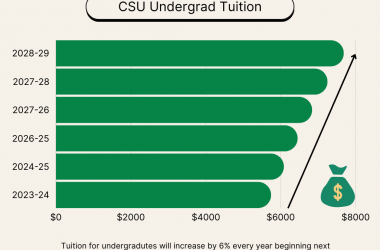As the current fiscal year nears to a close, negotiations between the Cal State University system and the Statewide University Police Association, a nonprofit organization representing 386 CSU campus police officers, have reached an impasse.
The CSU Board of Trustees and Statewide University Police Association (SUPA) met in March to discuss salary and benefits for campus police officers for the current fiscal year but were unable to come to an agreement.
According to CSU Spokesman Erik Fallis, at the bargaining table the CSU proposed to maintain salary and benefits with SUPA for the current fiscal year, as it has done with other unions, and reopen discussions in three months at the start of the new fiscal year of 2013-14.
“We’re interested in looking towards an agreement but … we are at a position financially as an institution where we are getting the same level of resources from the state as we got in 1997 to 1998,” Fallis said. “We have tens of thousands of more students to educate with those resources, and we have less overall to spend on everything that the university does.”
Fallis said that the CSU plans to set aside some money in the next fiscal year, if and when Gov. Jerry Brown’s proposed budget is approved, after which the CSU will resume collective bargaining with different groups on how to address increases to salary and benefits.
“Next year, if we can get the governor’s proposed budget, which has an increase, we do want to set aside a modest pool of compensation, and we do want to collectively bargain with our unions about that pool, but that’s all predicated on something happening at the state level to confirm that we actually do have that new budget available,” Fallis said.
However, SUPA President Jeff Solomon said a re-structuring of the police pay system and a long-term solution is needed to fix issues with salary and benefits.
“What we’re looking at doing is not just fixing the problem by getting a modest pool. What we’re looking at is fixing the problem,” Solomon said. “The problem is that we don’t get automatic step increases.”
Solomon said SUPA wants the CSU to unlock a 15-step pay scale, which would allow officers to automatically receive a 4.6 percent pay increase every year.
“Each year you do a good job, you get a modest increase; we don’t get that,” Solomon said. “We haven’t had a raise since 2007, so whatever you get hired at as a police officer at the CSU is what you stay at unless you negotiate a salary.”
According to the 2012-13 CSU Salary Schedule, the annual salary of a CSU campus police officer ranges between $49,620 and $68,388.
The current annual salary range for a University of California police officer is between $71, 376 and $92, 280, including a four percent longevity benefit after 10 years of service, according to the University of California, Berkeley Police Department website.
Solomon warned that as the economy begins to show some signs of recovery, more CSU police officers are either leaving or looking for higher paid positions with other agencies. He also said the situation will get worse if the CSU keeps delaying addressing the issue of salary and benefits.
“At the UC system, at the time of hire, they make more than 20 percent more than we do, and at a five-year mark, they make over 40 percent more than we do. So how do we expect to keep people?” Solomon said. “All we’re asking for is that they pay competitive wages, something similar to the UC system, by opening up the steps.”
Security on CSU campuses is also affected by officers leaving the CSU system for higher paid jobs at other agencies, Solomon said.
“All you have to do is … look at the crime [statistics] compared to the last year’s and the years before,” Solomon said. “Everything is on the rise and … part of that is due to the lack of officers on campus. The more people we lose, the more it puts my officers, the students, staff and campus community in jeopardy.”
However, according to the CSU, SUPA’s claims of high turnover of CSU officers and increased crime on campuses are not completely accurate.
“All these claims of high turnover and exodus are exaggerations tied to salary negotiations,” Fallis said. “What we have seen in terms of turnover for the SUPA division is pretty modest and normal.”
According to Fernando Solorzano, Cal State Long Beach’s University Police chief, the CSULB campus hasn’t encountered any of the challenges that concerned Solomon.
“I can very candidly say that the police department here at [CSULB] is not suffering those challenges,” Solorzano said. “We’ve maintained a staffing consistency. For the first time in 20 years, that I know, the [police] department has seen a small decrease in budget but not in staffing.”
According to Solorzano, overall crime on campus has also been decreasing.
In 2010, there were 10 reported incidents of car theft, and in the following year car theft decreased by half. There were five incidents of weapons possession in 2010 compared to only one in 2011, as reported in the CSULB University Police Crime Statistics website.
Solorzano said this decrease is due to effective security measures like surveillance cameras and the night escort program.
However, Solorzano said he agrees with SUPA’s efforts to increase pay for CSU officers. He said that campus officers do the same work as other university system police officers, and they should be compensated.
Currently, the CSU system and SUPA are awaiting the appointment of a mediator, which will bring bargaining between the two groups into mediation.
Staff Writer Marisol Samayoa contributed to this report.



